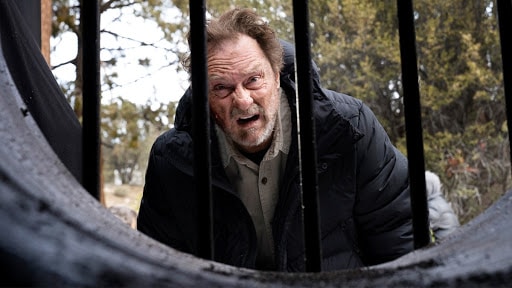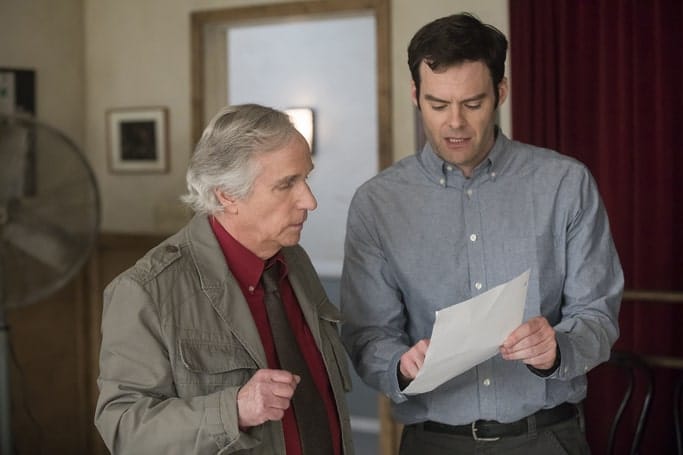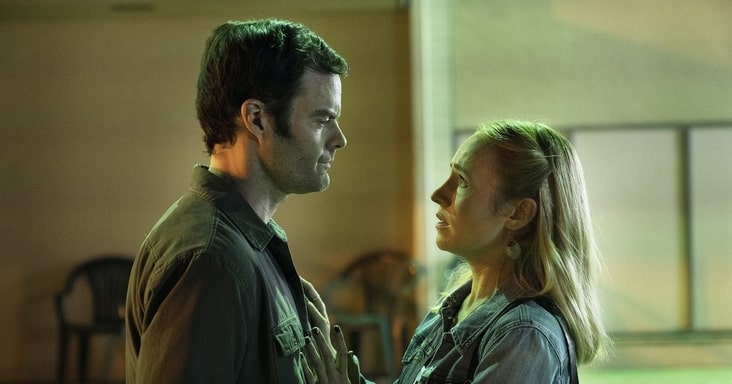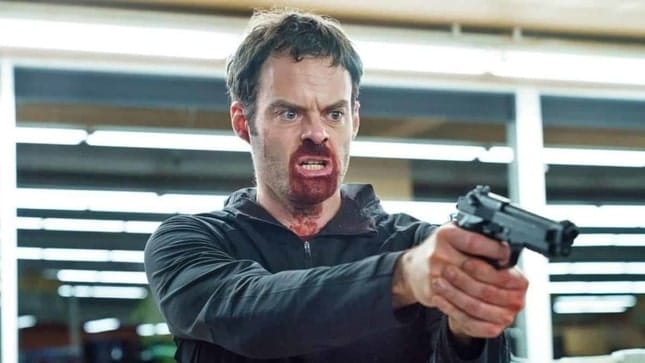Welcome to Original Characters, an ongoing series of Industrial Scripts’ articles examining the most original characters to appear in both TV and film. This article will focus on Barry Berkman from Barry.
Table of Contents
What is an Original Character?
It’s a character that sticks with you even when they’re long gone from your screens.
It’s a character that serves as a reference point in casual conversation or a character that sums up a behavior or generation.
original, adjective
“not the same as anything or anyone else and therefore special and interesting…”
— from The Cambridge English Dictionary
Most importantly, in screenplay terms, an original character is a character that shines through in spite of any other weaknesses within that screenplay.
For a Screenplay Reader or Development Executive an original character is an element of a script that shines through everything else. No matter how busy they are or no matter how much work other elements of the script need, the original characters stand out.
Great characters are at the very heart of great screenwriting and original characters can help elevate great to superlative.
Whether plucked from real life, an amalgamation of real people in real life or just simply a genius stroke of creativity, these are original characters…
The sixth in our original characters series will look at a beloved character who has graced our screens in recent years- Barry Berkman from Barry.
*The following article contains spoilers for Barry*
Who is Barry Berkman?
A marine? A hitman? An actor? Try all three.
During his time serving in the United States Marine Corps, Barry discovered his exceptional sharpshooting skills. He was praised for his talent and it came in handy as a marine. However, the emotional turmoil and high pressure of the war zone lead Barry to use his gift for the worse, killing innocent bystanders in the process.
His traumatic experience caused him to fall into a depression. An old family friend, Monroe Fuches, took advantage of his fragile state and groomed him into using his deadly skills as a hitman.
That’s where we meet Barry Berkman in the pilot. Living a dull and meaningless life in the Midwest. The world of violence and death takes a heavy toll on him, leaving him stuck in an existential crisis with no way out. This is until he’s sent to Los Angeles for an assignment from the Chechen mafia.
It’s there that he discovers the world of acting and the hopeful community that surrounds it. Finally, he’s found a potential light at the end of the tunnel. Unfortunately, it won’t be as easy to leave his hitman life behind as he had hoped.
Complex, Three-Dimensional Characters
The golden age of television is only getting better thanks to the plethora of original characters gracing our screens. These characters are diverse, complex, and multi-layered. They’re thought-provoking and engaging.
Real people have flaws, so should your characters. Why is it that we root for Barry when we know he’s a murderer? Maybe it’s because the people he kills are inherently bad people. We know he wants to change for the better, but the forces of darkness keep him from doing so. Or maybe it’s simply Bill Hader’s charm.
We root for him because we want to see him overcome his struggles and come out better on the other side. The writers of Barry beautifully intertwine the truth of the real world with the sensationalized fictional world, keeping audiences on board while at the same time keeping them entertained.
Well-written characters drive the story forward. They are the essence of a great script.
Characters in Barry
Barry Berkman isn’t the only complex character who adds compelling substance. Each character’s storyline is just as important as the main one. As the story progresses, the writers reveal hidden layers that develop the characters even further, making for notable character arcs.
Monroe Fuches

Monroe Fuches is Barry’s cowardly and self-centered family friend. Fuches swoops in during Barry’s lowest point after leaving the Marines. He grooms him into a deadly hitman, convincing Barry that killing is the only thing he’s good at. The two become partners. Fuches sets up the hits with different clients while Barry carries them out.
Fuches is emotionally manipulative. He constantly tries to win back Barry by offering false comfort for the double life he lives. Since Fuches is the only one who knows about Barry’s past, he’s the only person he can turn to when dealing with the emotional strains that accompany it.
Eventually, his acting teacher, Gene Cousineau, takes on this role as Barry’s mentor. From this point on, it’s clear that Barry has no use for Fuches anymore.
We watch Fuches’ desperation for Barry’s cooperation slowly turn deadly. When Fuches realizes he can’t gain back Barry’s loyalty, he decides to expose him for who he really is, unbothered by the life-shattering consequences.
Gene Cousineau

Gene Cousineau is Barry’s bold and brash acting coach. He comes across as cold, but once he and Barry start working closely together, we see a softer side to him. He takes on a mentor role for Barry. They confide in each other. In a sense, he’s found a father-figure that can replace Fuches.
When Barry is forced to kill Cousineau’s girlfriend, Detective Moss, the secret and the guilt really get to him. Barry’s broken the man who acts as his guide out of his life of violence. In many ways, it’s a sick thing to think about how Barry still pushes their relationship forward for his own personal gain.
The flip side to Cousineau’s self-assured theatre teacher persona is his career outside the class. Much like his students, he has a hard time securing roles. He’s an intriguing character in the mix of his fragility and authority.
Sally Reed

Sally Reed is an aspiring actress who Barry meets at Cousineau’s acting class. When Barry first stumbles upon the class, it’s her emotional performance that really opens Barry up to the beauty of acting.
Sally is a refreshing character in the sense that she’s familiar. She’s real and complex with her own flaws. We all know Sally, whether we see her in ourselves or in a friend of ours.
Much like Barry, Sally leads a double life in her own way. She moved to LA to pursue her passion for acting. She embodies a competitive, self-absorbed attitude. In season two, we see a more vulnerable side of Sally as we learn more about her abusive ex-husband.
We watch as she deals with accepting her own truth, forced to confront the fact that she never stood up to her abuser.
Just as we think that she’s ready to tell her true story, Sally changes her scene mid-performance. The shame and fear is too much for her to handle so she chooses the lie instead. However, to her surprise, the performance is met with acclaim from the audience.
People don’t always choose the right thing to do. People can’t always be as strong as they need to be. Unfortunately, Sally couldn’t escape her cycle of lies.
Finding Purpose

Like everyone else in the world, Barry Berkman is searching for a purpose. Now more than ever, Barry needs something to uplift him from the dark, depressing life he leads as a hitman. That’s where acting comes in.
He may not be necessarily good at it, but the emotion and fulfillment it creates is exactly what he needs.
When writing for the character, Alec Berg discusses the idea of someone being really good at the thing they hate while being really bad at the thing they love.
“We both liked this idea of a guy who does not like what he’s great at but falls in love with something that he might be terrible at and what should he pursue?”
Ironically, Barry’s best acting comes out when he’s able to trigger an emotional memory and channel it into his performance.
For instance, a monologue he delivers to his acting teacher, Gene Cousineau. Barry is bluntly told that acting isn’t his thing and that he should go back to wherever he came from. Right there, he confesses about his job as a hitman. He opens up about his internalized darkness that comes with the job, fearing it’s the only thing he’ll ever be good at.
Cousineau takes this as an improvised monologue. Barry’s emotional truth convinces Cousineau to give him another chance at his class.
Barry is constantly battling with himself, trying to leave the reality of his enraged killings behind him. No matter how hard he tries, he’ll never be able to escape the guilt and shame of his past life.
In the words of Gene Cousineau, “acting is truth”. However, Barry’s truth is the thing that will lead to his demise.
Barry Berkman’s Double Life
The central conflict of the series is Barry’s double life of acting and killing constantly threatening each other. Which persona will prevail, Barry Block the actor or Barry Berkman the killer?
Naturally, a hitman and an actor live in two very contrasting worlds. In one world, you’re forced to live in the shadows with a disconnect to any and all emotions. In the other, you’re in the spotlight where you’re pulling from those same emotions. This jarring juxtaposition is enough to get anyone interested in watching.
Many great modern TV series consist of a character desperately trying to protect a lie and/or living a double life (from The Sopranos to Breaking Bad to Big Love). And Barry fits firmly into this category. He has two different sides to himself and he can’t reveal either one to the other. He’s trapped between keeping up two facades, two different sides of his personality.
This duality is a classic recipe for drama, primarily as it naturally layers subtext into dramatic exchanges. When Barry is with his acting class, he holds a dark truth about who he really is. Whilst when he is working as a hitman, he carries a heavy burden about what he is doing and how he is trying hard to leave this life behind.
Barry works so well as a series in part because it takes the great dramatic formula of the protagonist concealing a lie and applies it to two idiosyncratic and original contrasts – a killer hitman and an amateur actor. This, in turn, allows space for two genres to co-exist, comedy (stemming from the incongruity of the contrasts) and thriller (stemming from the nature of a hitman career). The genre juxtaposition is not an easy balance to pull off, but the series handles it brilliantly.

Barry Berkman’s Character Development
The big question to be answered is “can Barry change his nature?”. All Barry wants is to move on from his life of violence. He believes that he isn’t a violent person by nature, but rather forced by uncontrollable circumstances.
He’s finally found an outlet where he can use his trauma as a positive and cathartic outlet. Even if acting doesn’t come as naturally, there’s still hope. Or so we’d like to believe.
Fuches keeps him tethered to his hitman persona. He acts as a constant voice in Barry’s head, telling him killing is all he’ll ever be good at. Telling him that he is in fact violent by nature. It isn’t until the finale of season two that we realize that Fuches was right all along, Barry lashing out in a violent spree.
As much as the audience wants Barry to change for the better, he can’t shake the darkness inside of him. This is what makes Barry such an alluring character. Barry represents an extreme version of what we can all relate to, the conflict between one’s inner nature, past and conditioning versus who they most aspire to be.
What Makes Barry Berkman an Original Character?
Barry Berkman is a complete 180 from your stereotypical hitman archetype. There’s a realness to the character that doesn’t glamorize a violent lifestyle. He’s dark and miserable yet the comedic tone of the series balances perfectly with the drama.
What makes Barry such an original character is that the audience doesn’t just see him as a typical hitman or actor. They see something personal in him. He’s a lonely, broken guy who needs a sense of purpose and community. The writing focuses on the emotion and lets that drive the story forward.
In many ways, Barry is a type of anti-hero. Whether he wants to believe it or not, he’s an inherently violent guy. The odds are against him. If he gets what he wants and becomes a famous actor he’ll eventually be exposed. It’s an intriguing dynamic that keeps the audience on their toes.
We both simultaneously wish for Barry’s dreams to come true but know they never can without seriously compromising the very vision he has for himself. It’s an equation that will never work.
Want to have a go at creating great characters like Barry Berkman from Barry? Check out our Ultimate Guide to Writing Characters That Fascinate.
- What did you think of this article? Share It, Like It, give it a rating, and let us know your thoughts in the comments box further down…
- Struggling with a script or book? Story analysis is what we do, all day, every day… check out our range of script coverage services for writers & filmmakers.
This article was written by Madison Kemeny and edited by IS Staff.
Get *ALL* our FREE Resources
Tackle the trickiest areas of screenwriting with our exclusive eBooks. Get all our FREE resources when you join 60,000 filmmakers on our mailing list!


Love your breakdown, keep coming with great stiff like this, i really appreciate it and learned a lot from it!
Thank you guys.
Most welcome Peter!
I love this show- you articulate the very reasons why!
It’s great, isn’t it? Glad you liked the piece…